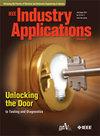基于改进 QPLL PMSM 驱动器的无传感器自适应 SMO 与混合阶广义积分器,用于 LEV 应用
IF 4.2
2区 工程技术
Q2 ENGINEERING, ELECTRICAL & ELECTRONIC
引用次数: 0
摘要
传统的滑动模式观测器(SMO)带有一个低通滤波器,但由于开关功能不连续,导致性能下降,特别是在低速情况下,因此受到一些限制。本文为永磁同步电机(PMSM)驱动引入了一种新型自适应 SMO,有助于进行无传感器速度和位置估算。为减少颤振效应,采用了基于增益的自适应 sigmoid 函数作为开关函数。此外,通过采用混合阶广义积分器(MOGI)作为预滤波器,减少了谐波含量和估计的反向电动势的直流偏移。为了提取转子速度和位置并减轻逆变器非线性引起的谐波,采用了改进的正交锁相环 (IQPLL)。这种方法提高了 QPLL 的估计性能,同时不影响带宽或引入传统 QPLL 的典型相位延迟,并实现了选择性谐波消除。综合研究结果表明,所提出的方法在提高速度和位置估计精度方面非常有效,同时还解决了与传统技术相关的固有难题。获得的结果支持了无传感器 SPMSM 的整体性能。本文章由计算机程序翻译,如有差异,请以英文原文为准。
Sensorless Adaptive SMO With Mixed Order Generalized Integrator Based Improved QPLL PMSM Drive for LEV Application
The conventional sliding mode observer (SMO) with a low pass filter is constrained by several limitations due to discontinuous switching functions leading to degraded performance, particularly at low speeds. This paper introduces a novel adaptive SMO for permanent magnet synchronous motor (PMSM) drive, facilitating sensorless speed and position estimation. To reduce chattering effect, an adaptive gain-based sigmoid function is used as a switching function. In addition to this, harmonics contain, and DC offset from estimated back-EMF are reduced by employing mixed order generalized integrator (MOGI) as prefilter. To extract rotor speed and position and to mitigate harmonics arising from inverter nonlinearities, an improved quadrature phase locked loop (IQPLL) is utilized. This approach enhances QPLL estimation performance without compromising bandwidth or introducing phase delays typically associated with conventional QPLLs as well as achieving selective harmonics cancellation. Collective findings demonstrate effectiveness of proposed methodology in enhancing speed and position estimation accuracy while addressing inherent challenges associated with conventional techniques. Overall sensorless SPMSM performance is supported by obtained results.
求助全文
通过发布文献求助,成功后即可免费获取论文全文。
去求助
来源期刊

IEEE Transactions on Industry Applications
工程技术-工程:电子与电气
CiteScore
9.90
自引率
9.10%
发文量
747
审稿时长
3.3 months
期刊介绍:
The scope of the IEEE Transactions on Industry Applications includes all scope items of the IEEE Industry Applications Society, that is, the advancement of the theory and practice of electrical and electronic engineering in the development, design, manufacture, and application of electrical systems, apparatus, devices, and controls to the processes and equipment of industry and commerce; the promotion of safe, reliable, and economic installations; industry leadership in energy conservation and environmental, health, and safety issues; the creation of voluntary engineering standards and recommended practices; and the professional development of its membership.
 求助内容:
求助内容: 应助结果提醒方式:
应助结果提醒方式:


